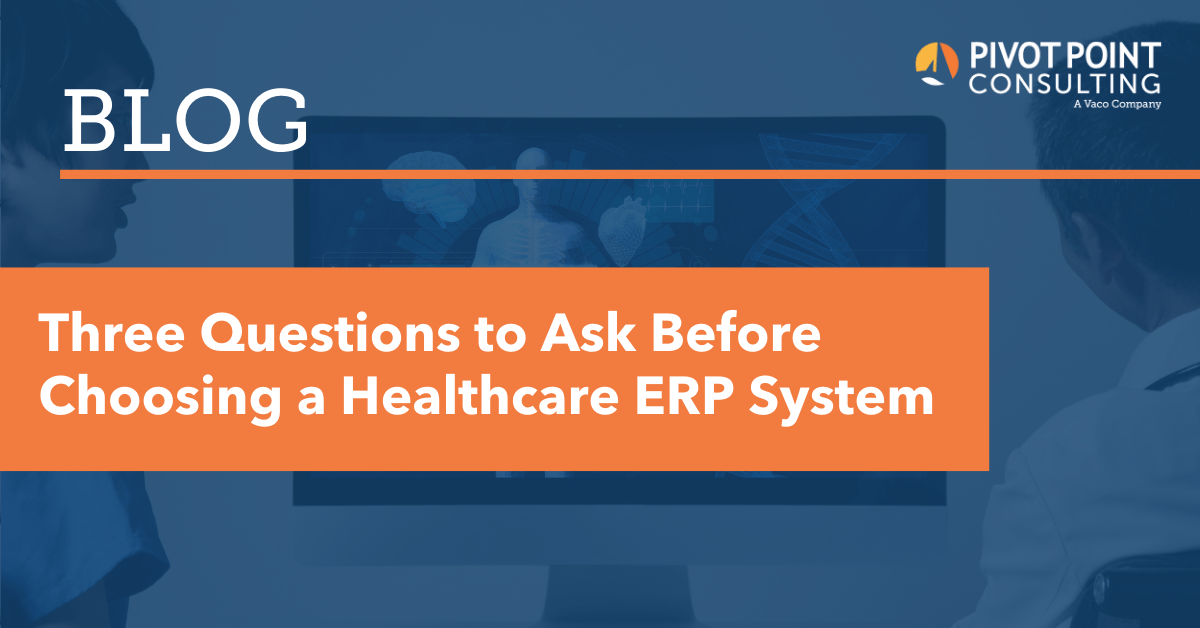Hospital and healthcare leaders choosing an Enterprise Resource Planning (ERP) system might have unsettling flashbacks of choosing their EHR technology more than a decade ago.
It’s not just that the acronyms are similar. As with picking an EHR, selecting the right healthcare ERP system is both critical and challenging. There are multiple vendors, each promising a tailor-made solution. And there are plenty of considerations including compatibility, performance, and customer support. Of course, there’s no federal mandate, like there was with EHRs, but hospitals and health systems are no less compelled by the need for greater efficiency and data to help drive actionable decisions that contribute to overall quality care.
Underlying it all is the fact that an ERP platform that manages scheduling, payroll, benefits, recruiting, supply chain management, financials and more affects every associate in the healthcare system. EHR systems, on the other hand, tend to impact only clinical staff.
A well-designed and user-friendly ERP can create efficiencies across-the-board, while it supports the systems that let clinicians do their work. It also can improve employee engagement and autonomy by enabling self-service of simple tasks that previously required interacting with Human Resources, for example.
Of course, because of today’s interrelated IT landscape, choosing the wrong system (or even worse, the right system with a bad deployment) can also make operations worse.
With so much at stake, it’s important to identify the right system. Here are some steps that will make the process easier.
Expert opinions and references
Weighing the merits of vendors in the field can be a challenge for purchase decision makers at health systems and hospitals. It’s often more efficient to work with a consulting firm that has a deep knowledge of the vendors and their products and can match them to clients’ needs. A consultant can recommend the right system, help strategize and advise for a better ROI and more efficiency.
Another suggestion is to check experts’ unbiased opinions of ERP vendors. For example, KLAS Research does an annual evaluation of leading healthcare technology and services. The report compares various products not only to each other but also by user opinion.
The Best in KLAS 2022 report evaluated ERP systems in the areas of scheduling, talent management, and time and attendance. It ranked Workday HCM, Infor CloudSuite and Oracle Cloud as best overall.
Of course, no one knows an ERP better than the people using it. That’s why it’s a smart step to ask a potential vendor partner for three customer references. Be sure to specify that you want unpaid references and insist that the references represent organizations that are similar to yours and are using the same system you’re considering. A vendor who’s reluctant to provide references is likely a vendor to avoid.
With that said, get specific information from references. Ask about setup and implementation, compatibility challenges, customer support, the upgrade process, user satisfaction, benefits realized and any other questions you might have. The more answers you get, the better you’ll be able to judge not only the system, but the potential vendor partner overall. If possible, ask to see the system in action at a referred company.
While consultants and research firms can help narrow the list of vendor candidates, there are three factors to consider before making choosing an ERP.
Look for proven partners and easy implementation
ERPs have been in the market long enough that there is no reason to take a chance on an unknown vendor or unproven technology. While the vendor does not have to be someone you’ve done business with before, it should be a company with a track record of success in the industry.
In fact, it can be a mistake to go with a current vendor for the sake of familiarity. Just because a company is good at one aspect of healthcare IT, doesn’t mean it’s good at all facets of technology.
Don’t be seduced by low prices. Whatever you save by buying an unproven or bare-bones ERP will be lost many times over through poor performance.
A big consideration is the deployment timeline. The faster the new ERP is in place, the sooner you’ll realize the benefits. Don’t settle for vague assurances on deployment. Get details by asking for a schedule of installation, staff training, rollout, troubleshooting etc.
Check usability
An ERP is only as good as its end users find it to be. If employees find it confusing, time-consuming, or difficult to operate, they will get frustrated and look for workarounds. When that happens, the promise of the system goes unfulfilled, and the efficiency benefits simply won’t be realized.
A good ERP should be easily operated from desktops, tablets and smartphones.
Upgrades should be routine and seamless.
Demand integration and interoperability
To realize maximum efficiencies, an ERP should be interoperable with other IT systems, particularly your EHR. An ERP can capture data from electronic health records that will inform better decision making. System compatibility can eliminate waste and redundancy in operations, reduce staffing and make life easier for all associates.
Eventually you might want to integrate your healthcare ERP system with your customer relationship management (CRM) system. A hospital or healthcare system with well-integrated systems–ERP, EHR and CRM–will operate more smoothly and unlock unimagined efficiencies.
Like any comprehensive IT system, a high-functioning ERP can make work easier and more efficient. A poorly designed one can make things worse. To choose wisely, investigate, evaluate, and use trusted advisors to make the best choice.


